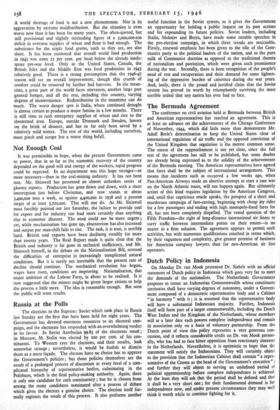The Bermuda Agreement
The conference on civil aviation held at Bermuda between British and American representatives has reached an agreement. This is at least an advance orr the achievements of the Chicago Conference of November, 1944, which did little more than demonstrate Mr. Adolf Berle's determination to keep the United States clear of international regulation of air traffic and the opposed conviction of the United Kingdom that regulation is The merest common sense. The extent of the rapprochement is not yet clear, since the full text of the agreement has still to be published, but some doubts are already being expressed as to the solidity of the achievements of the Bermuda meeting. The American representatives have agreed that fares shall be the subject of international arrangement. This means that incidents such as occurred a few weeks ago, when Pan-American Airways made an abortive attempt to start a rate war on the North Atlantic route, will not happen again. But ultimately action of this kind requires legislation by the American Congress, and, until that capricious orade speaks, the prospect of a short and murderous campaign of fare-cutting, beginning with cheap joy rides for a few passengers and ending with high monopoly-fixed fares for all, has not been completely dispelled. The vexed question of the Fifth Freedom—the right of long-distance international air liners to carry traffic between intermediate points on their routes—is no nearer to a firm solution. The agreement appears to permit such activities, but with numerous qualifications couched in terms which, by their vagueness and complexity, give greater promise of business for American company lawyers than for non-American air line operators.


























 Previous page
Previous page